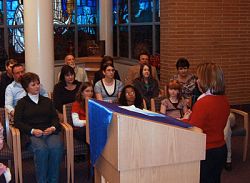Adults come fully into the Church through RCIA

DRAPER — The Rite of Christian Initiation of Adults (RCIA) is a process of preparing the unbaptized and baptized members of other Christian churches who wish to become Catholics. "At St. John the Baptist Parish, Draper, we have a year-round RCIA process, which begins in February with five or six people that gains momentum and people as we get closer to September," said Martha Happ, RCIA director. "In our process, we take people where ever they are, in what ever faith background they come from, or lack there of, and we meet them at that point. "The RCIA team at St. John the Baptist listens to the inquirers faith stories, and shares their own personal faith journeys with the inquirers. "During a recent discussion, one candidate brought up the point that they are choosing Catholicism as adults," said Happ. "It is very profound when these people do choose another religion than that in which they were brought up and go against the teachings of their families because they have found God. In all my experiences in RCIA, I feel like all these people who are coming to RCIA are searching for a relationship with God on a more personal level." Charles Woods, a member of the Saint John the Baptist RCIA team, said he wants the elect and candidates to have a good experience and find what it is they are looking for because many of them have read about the Catholic faith and have come to find out if what they have read is true. "Our team focuses on teaching what the Church teaches. We give each person a "Catechism of the Catholic Church" at the beginning of the year, and are very church centered and Christ centered. "We give the catechumens and candidates a tour of the church and show them everything and explain the Mass to them," said Woods. "We encourage them, if they are not already going to Mass, to start going to Mass. We always check up with them at the next session to see what their experience was like and answer any questions they may have. We are trying to be good tenders of the garden and allow them to see if this is where God is calling them. We want to be very welcoming and very open." Happ said from the inquiry period they move into a catechumenate period with the Rite of Acceptance where the catechumens and candidates discern whether or not they are ready to go forward and commit to becoming Catholic. "We explore through the catechumenate process and seek the Catechism of our faith," said Happ. We offer classes every Tuesday evening." "This is a period in which we try to instill a good prayer life with the catechumens and candidates," said Woods. "This is where many of them are committed and trying to learn everything they can about the Catholic faith." "As we get closer to Lent, we begin another discernment process before the period of purification and enlightenment," said Happ. "Then on the first Sunday of Lent, we have the Rite of Election where the catechumens become the elect. "From that point we begin to focus on purifying ourselves to prepare ourselves for the Easter sacraments," said Happ. "We prayerfully discern our behaviors and the choices we are making. After the discernment classes, we are at the Easter sacraments." Happ said during the third, fourth, and fifth Sundays of Lent, they celebrate the three scrutinies. On these three Sundays, the Gospel readings are of the woman at the well, the man born blind, and the raising of Lazarus. "That brings us from our own personal sin, to communal sin, to the resurrection," said Happ. "This is a time during Lent when both the Catholic community and the elect can reflect together spiritually on the paschal mystery. "This is a period of more intense spiritual preparation, consisting more of interior reflection than in catechetical instruction, and is intended to purify the minds and hearts of the elect and candidates as they search their own consciences. This period of time is intended for the elect, the candidates, and the Catholic community to be enlightened with a deeper knowledge of Jesus Christ. "Then we go to the Easter Vigil, and we welcome these people who have chosen to continue into the Catholic Church," said Happ. "This is a great spiritual high and there is nothing like the joy expressed on their faces at the Easter Vigil," said Woods. "From there we continue with them in mystagogy. This is unfolding the mystery of what the new Catholics have just been through and assimilate them into the church life," said Happ. "It is a wonderful process. It is a great gift to be working with them at this time in their lives," said Happ. "It is a great gift to our entire RCIA team, which has 14 members. We feel that walking with them as they are choosing the Catholic faith is a great way for us to nourish and share our faith with them. "We have a wonderful team of people who give their own special gifts individually," said Happ. "We all recognize that it takes all of us to make up this team and it is a great team effort that helps these people on their spiritual journey into the Catholic Church. Father Terence Moore, pastor of Saint John the Baptist Parish, has a wonderful spirituality and welcomes all these people to the church. Deacon Paul Graham and deacon candidate Dale Dillon are great assets to the RCIA process as well."
© Copyright 2024 The Diocese of Salt Lake City. All rights reserved.

Stay Connected With Us